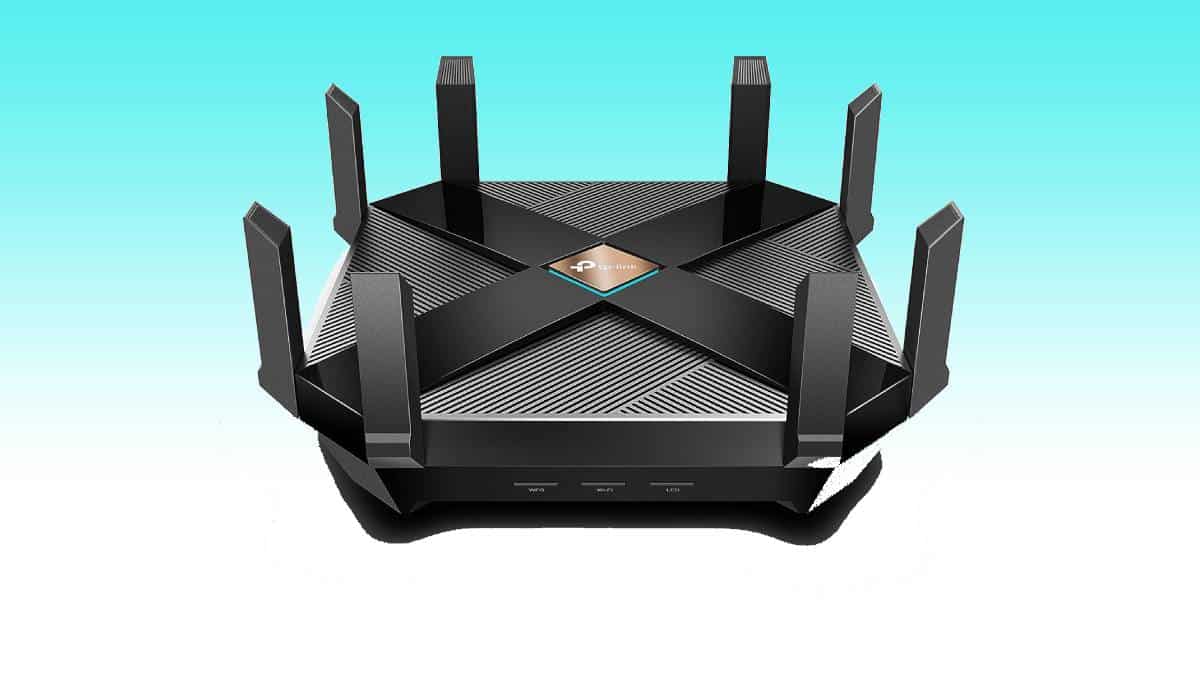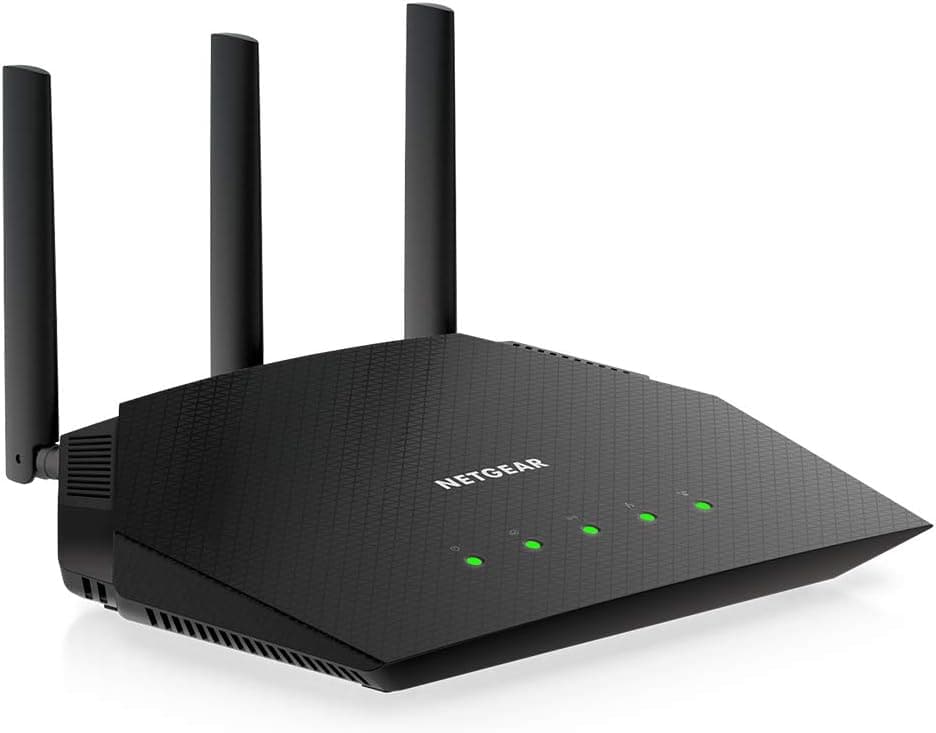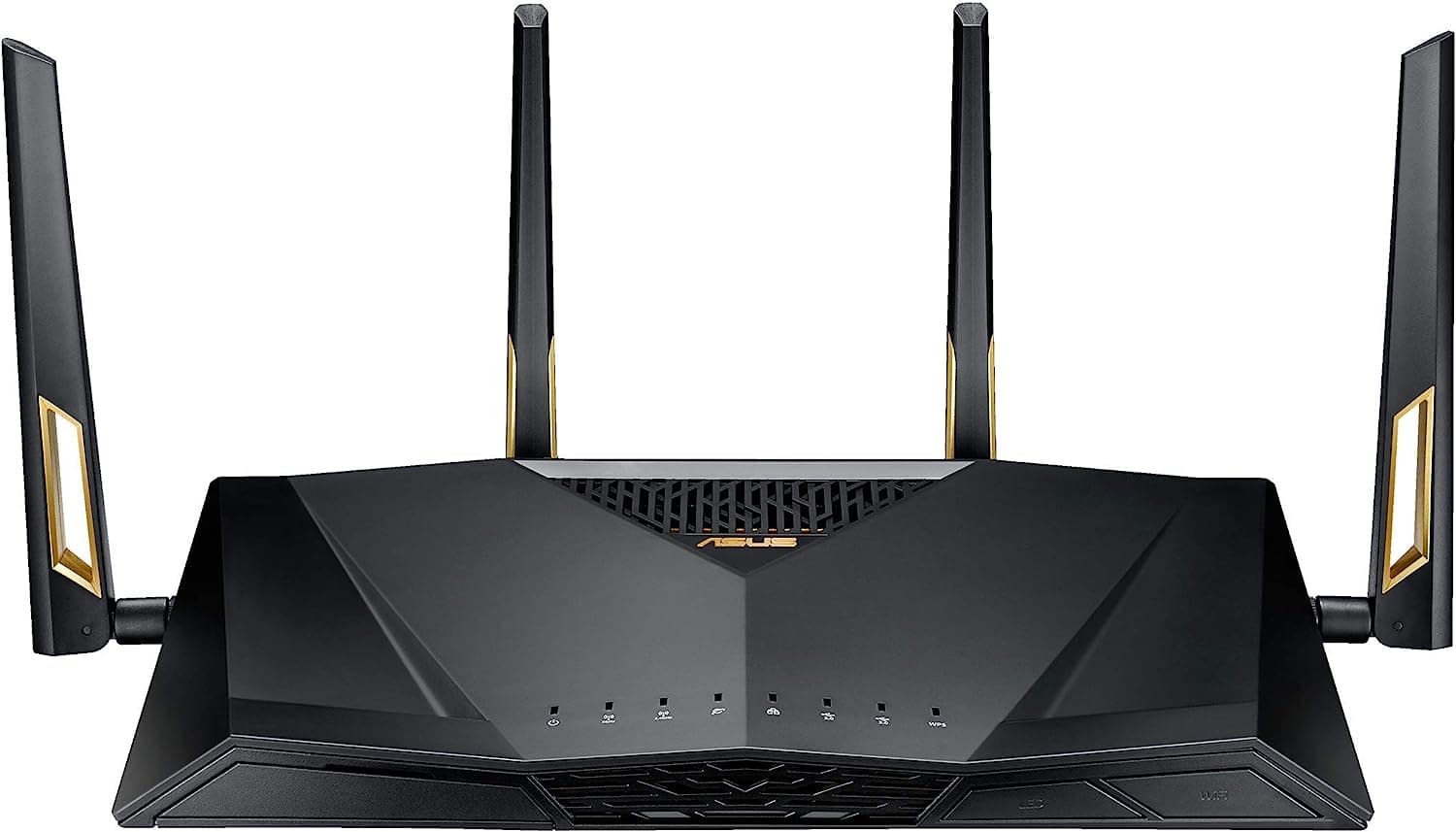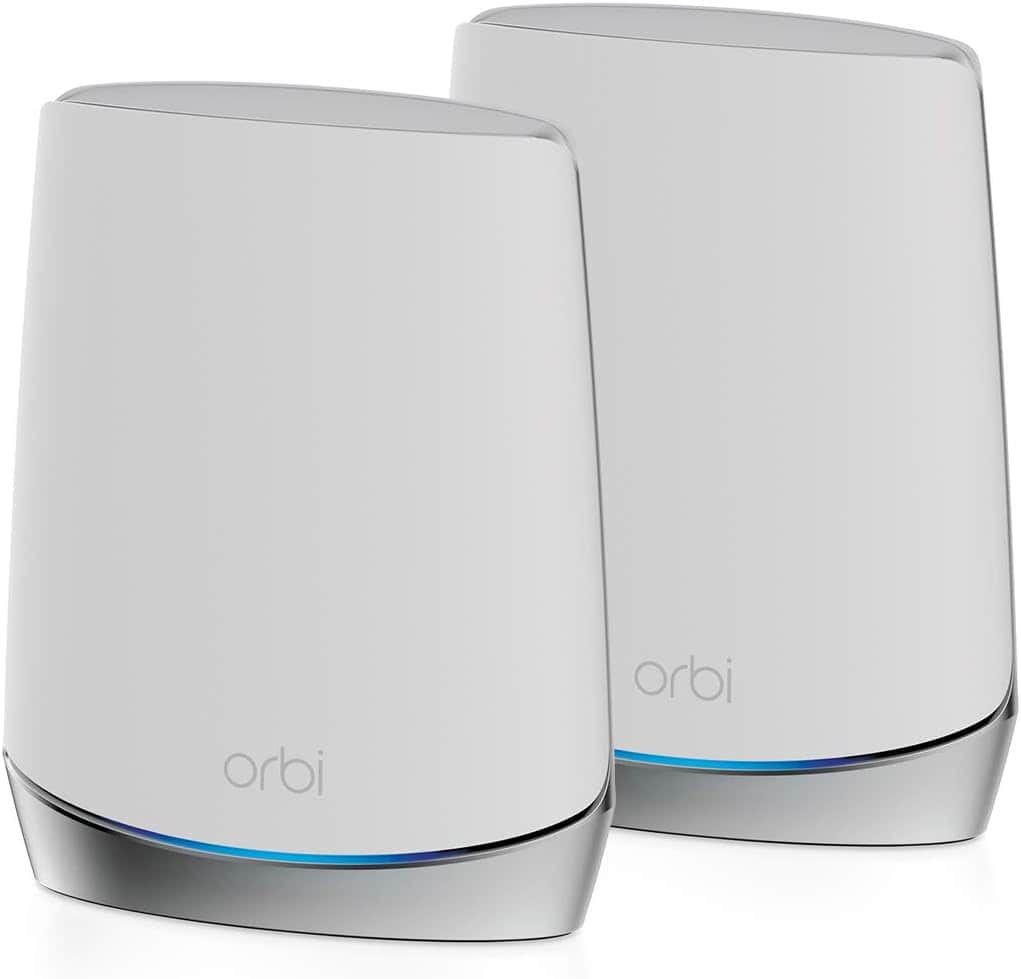Best router for Cox in 2025 – our top compatible WiFi routers

Table of Contents
Cox Internet is well-known for its affordable and reliable service in the US. The brand provides internet services only in 19 states, but it has a solid reputation for providing a high-quality service in those areas. If you look at the plans, you will find budget-friendly ones, high-end 2 Gbps plans, and everything in between. This makes it suitable for all kinds of users.
-
Best router for Cox
TP-Link AX6000 WiFi 6 Router
- Standard: WiFi 6
- Frequency bands: 5 GHz, 2.5 GHz
- Max speed: 5.98 Gbps
- LAN ports: 8 x 1Gbps
-
Best value router for Cox
NETGEAR 4-Stream WiFi 6 Router (R6700AX)
- Standard: WiFi 6
- Frequency Bands: 5 GHz, 2.4 GHz
- Max speed: 1.8 Gbps
- LAN ports: 4 x 1Gbps
-
Best rourter for Cox Gigablast
ASUS AX6000 WiFi 6 Gaming Router (RT-AX88U)
- Standard: WiFi 6
- Frequency bands: 2.5 GHz, 5 GHz
- Max speed: 6 Gbps
- LAN ports: 8 x 1 Gbps
-
Netgear Orbi RBK752
- Standard: WiFi 6
- Frequency Bands: 5 GHz, 2.4 GHz
- Max speed: 4.2 Gbps
- LAN ports: 4 x 1 Gbps (router), 2 x 1 Gbps (satellite extender)
How we picked the best router for Cox
These days, you can find third-party Cox-compatible routers that come with the latest WiFi standards, such as WiFi 7. WiFi 6 is still more than enough for most users. If you’re using a low-speed plan, you may be fine with a WiFi 5 router. However, if you’re using the Cox Go Fast or Go Super Fast plan or something better, then you’ll need to opt for a router that can support high speeds and also stays stable under load.
Prime Day is finally here! Find all the biggest tech and PC deals below.
- Sapphire 11348-03-20G Pulse AMD Radeon™ RX 9070 XT Was $779 Now $739
- AMD Ryzen 7 7800X3D 8-Core, 16-Thread Desktop Processor Was $449 Now $341
- ASUS RTX™ 5060 OC Edition Graphics Card Was $379 Now $339
- LG 77-Inch Class OLED evo AI 4K C5 Series Smart TV Was $3,696 Now $2,796
- Intel® Core™ i7-14700K New Gaming Desktop Was $320.99 Now $274
- Lexar 2TB NM1090 w/HeatSink SSD PCIe Gen5x4 NVMe M.2 Was $281.97 Now $214.98
- Apple Watch Series 10 GPS + Cellular 42mm case Smartwatch Was $499.99 Now $379.99
- ASUS ROG Strix G16 (2025) 16" FHD, RTX 5060 gaming laptop Was $1,499.99 Now $1,274.99
- Apple iPad mini (A17 Pro): Apple Intelligence Was $499.99 Now $379.99
*Prices and savings subject to change. Click through to get the current prices.
In this guide, we have listed the best routers for Cox based on speed, connectivity, security features, and price. But of course, we’ve also considered the thoughts of users, and general sentiment towards available products.
Should you have specific needs for your next router, there are a few things to consider. For example, you may want a modem router combo, or a router with parental controls. Be sure to check that any option is compatible with Cox!

- Standard: WiFi 6
- Frequency bands: 5 GHz, 2.5 GHz
- Max speed: 5.98 Gbps
- LAN ports: 8 x 1Gbps
- Multi-gig WAN port and 8x LAN ports
- Dependable 64-bit Quad-Core CPU
- 8 antennas for wide coverage
- Bulky design may not suit everyone
- Not recommended for low-speed plans
When it comes to the best routers for Cox, we think that the TP-Link Archer AX6000 router is a good option.
This router runs WiFi 6 technology, which is one of the new WiFi standards. It is a dual-band router that is capable of reaching speeds of up to 5952 Mbps (4804 Mbps from 5GHz and 1148 Mbps from 2.4GHz), so you should be able to get sufficient speeds for streaming and gaming.
For the wired experience, you get a 1x 2.5 Gbps WAN port and 8x Gigabit LAN ports, along with 1x USB-C 3.0 and 1x USB-A 3.0 ports. Having 8 Gigabit LAN ports is quite impressive. You can plug in your console, PC, smart TV, and so much more without running out.
As far as coverage is concerned, the router has 8 antennas to boost network coverage, so you should be able to get a steady internet connection throughout your house. The router is compatible with OneMesh, which means you can simply add a OneMesh range extender and get wider coverage.
…the router is compatible with OneMesh, which means you can simply add a OneMesh range extender
PC Guide
The router is powered by a 64-bit Quad-Core CPU, which should be able to take the load and deliver reliable performance. Which is why we think it’s one of the best routers for fiber internet.
In addition to this, the TP-Link Archer AX6000 comes accompanied by TP-Link HomeCare, an app that offers parental controls, built-in antivirus, QoS, and so much more.
If you want a jack-of-all-trades router to complement your Cox connection perfectly, the TP-Link Archer AX6000 is a very good choice.

- Standard: WiFi 6
- Frequency Bands: 5 GHz, 2.4 GHz
- Max speed: 1.8 Gbps
- LAN ports: 4 x 1Gbps
- Dual-band connectivity
- 20+ connected devices supported
- Affordable pricing
- Subscription-based security features
- Won’t offer a 6GHz band found in the WiFi 7 standard
If you want a good router for Cox without spending too much, then we think that the Netgear R6700AXS might be a good option.
The router is dual-band, so you get 2.4GHz and 5GHz bands, which support speeds of up to 1.8 Gbps. For most users this is more than enough for daily home usage. Plus, you get coverage up to 1,500 sq ft and it can handle up to 20 devices at the same time, which should make it suitable for smart home devices.
For the ports it features a rather standard configuration of 4x Gigabit LAN ports and 1x Gigabit WAN port. Since this is a budget router, it lacks some features, such as a multi-gigabit port and USB port.
…you can use the Nighthawk App and get going rather easily.
PC Guide
For the setup, you can use the Nighthawk App and get going rather easily. Plus, the app also has advanced parental controls and other security features, but they are subscription-based, which is disappointing. Apart from that, if you have just gotten a Cox plan and want a router that offers the most value for money, then this router might be a good fit.
For other affordable options, we recommend checking out our top picks for the best budget routers.

- Standard: WiFi 6
- Frequency bands: 2.5 GHz, 5 GHz
- Max speed: 6 Gbps
- LAN ports: 8 x 1 Gbps
- Speeds of up to 6,000 Mbps
- 8 x Gigabit LAN connections
- AiProtection Pro for additional security
- A bit expensive compared to other options
- Overkill if not primarily used for gaming or with a high-speed plan
If you have a fast Cox plan, then you can consider getting the ASUS AX6000 to make the most of your plan.
For starters, you get a dual-band network that can handle speeds of up to 6,000 Mbps, which should give you a stable network for gaming and streaming. The four external antennas can cover your entire home and eliminate dead zones. Plus, with MU-MIMO and OFMDA, you should be able to connect multiple devices efficiently. In case you want to expand the coverage area, you can always make use of the Asus AiMesh system.
As far as wired connections go, it has 8x Gigabit LAN ports that should handle all of your priority devices (PC, console, and TV) without running out of ports. Along with that, you also get 2x fast-speed USB 3.1 Gen1 ports.
…you get 8x Gigabit LAN ports that should handle all of your priority devices.
PC Guide
On the inside, the router uses a quad-core CPU that has 1GB RAM and 256 MB flash memory. This level of power should make it suitable for intense loads like long gaming sessions or streaming.
Coming to security, you get the AiProtection Pro, which has been powered by Trend Micro. With this, you get regular automatic updates to security signatures, which protects your devices from threats. Overall, the ASUS AX6000 is the best router for Cox Gigablast, and after taking a look at its specs, we think it deserves to be one of the best gaming routers.

- Standard: WiFi 6
- Frequency Bands: 5 GHz, 2.4 GHz
- Max speed: 4.2 Gbps
- LAN ports: 4 x 1 Gbps (router), 2 x 1 Gbps (satellite extender)
- Mesh system, so ideal for multi-point access
- Coverage up to 5,000 sqft
- Can support speeds up to 4.2 Gbps
- Overkill if not used with high-speed Cox plans
- Additional nodes are expensive
If you have a high-speed internet plan from Cox and are looking for a mesh router to pair it with, then we’d recommend the Netgear Orbi RBK752, which is one of the best mesh routers in the market.
To begin with, the RBK752 is a tri-band router and it comes with WiFi 6. The router can handle up to 4.2 Gbps, so you can get the most out of the top-tier internet plan from Cox with this router. You can also find four Gigabit Ethernet ports on the back of the router, with the extender offering two Gigabit ports.
And if the current range isn’t enough, you can always purchase another extender
PC Guide
The pack we selected comes with one router and one extender. When combined, they promise to offer a range of up to 5,000 sqft. This makes them a solid choice for a large home with around five bedrooms. If the current range isn’t enough, you can always purchase another extender and add it to your system.
Setting up the router is also pretty simple, as you can do it instantly using the Orbi app. In addition, the Netgear Orbi RBK752 can connect with up to 40 devices simultaneously, and the 1.5GHz quad-core processor and 1GB of RAM packed inside it should help the router perform smoothly under load.
How to pick the best router for Cox
To save time, you shouldn’t just go ahead and select one of the best wireless routers in the market. Instead, you need to take your time and find a Cox compatible router that can handle high speeds and comes with additional features. Here are a few things you should consider before making a final purchase.
WiFi technology
Think of your new WiFi router as an investment. Also, consider the fact that you will be using it for quite some time. With that said, you should be getting a WiFi 6 router, as this is one of the latest WiFi standards. Plus, it is widely used, so most of your devices would be compatible with it.
Frequency bands
While WiFi 7 routers come with an additional 6 GHz band (also found in WiFi 6E), WiFi 6 routers usually come with a 5 GHz and a 2.4 GHz band. The 5 GHz delivers faster speeds over a shorter range than the 2.4 GHz band. The 2.4GHz band delivers slower speeds but has a longer range. The 6 GHz has a wider spectrum than 5 GHz, and more bandwidth for faster speeds.
Coverage
The area covered by the router is usually mentioned in the product description, so you can get a fair idea about it. The goal is to get a stable internet connection throughout your house, so the right coverage will depend on the area of your house or office. For instance, the best WiFi routers for large homes can cover up to 5000 sq. ft. of area or more. Netgear also recommends setting up a WiFi mesh system for increased coverage, as it is perfect for homes or offices with multiple floors.
Security and parental controls
Another important feature that you should consider is security. Most routers offer basic protection like weekly security reports, guest networks, and more. Some of the best parental control routers let you limit children’s exposure to the internet and promote healthier online habits. However, you shouldn’t only rely on security features. There are a few steps you should take to keep your network more secure, such as changing the default SSID, regularly updating the router, setting up a guest network, and changing all default passwords.


